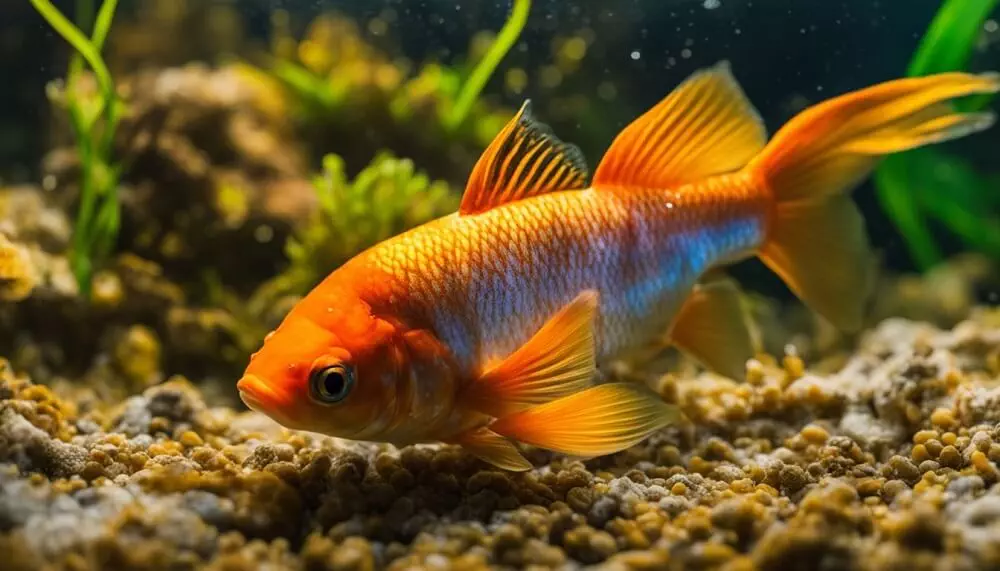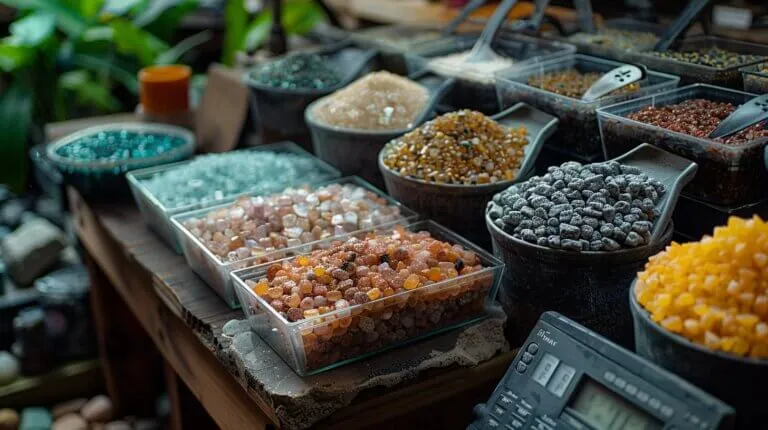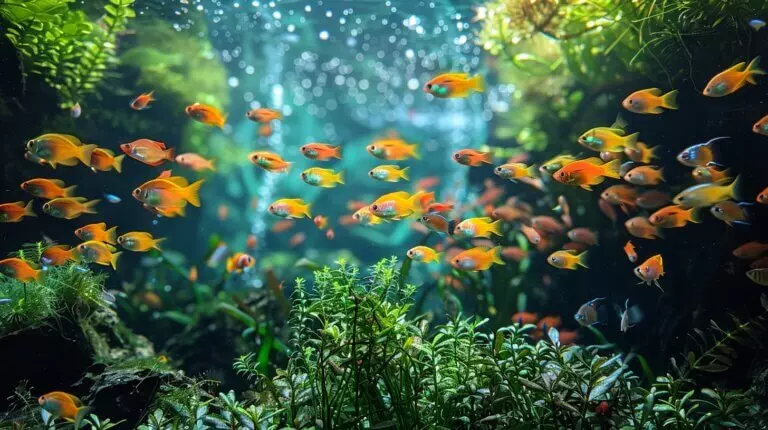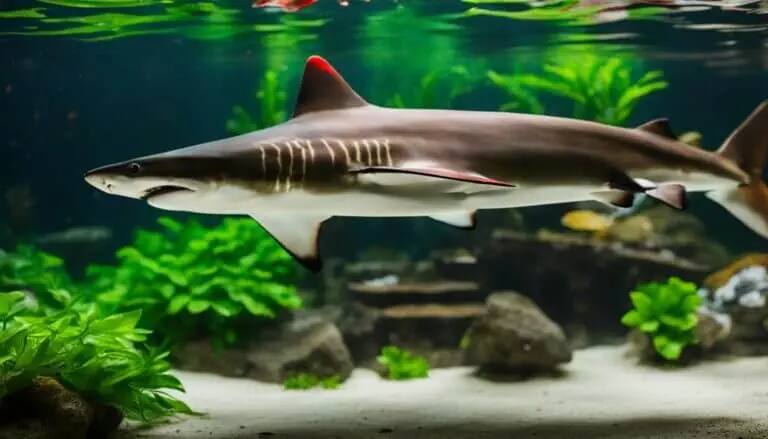When you bring home a new goldfish, you might wonder how long your aquatic companion will live. Many people believe goldfish have short lifespans, but with proper care, they can thrive for years—even decades! In this guide, we’ll explore the factors that influence goldfish longevity and provide tips to help your fish live a long, healthy life.
Goldfish are hardy creatures, but they still require a suitable environment and attentive care to reach their full potential. With the right tank setup, water quality maintenance, and a balanced diet, your goldfish can be a long-term addition to your home aquarium.
Let’s dive into the details and discover how to give your goldfish the best chance at a long, happy life.
Understanding the Lifespan of Goldfish: Expectations vs. Reality
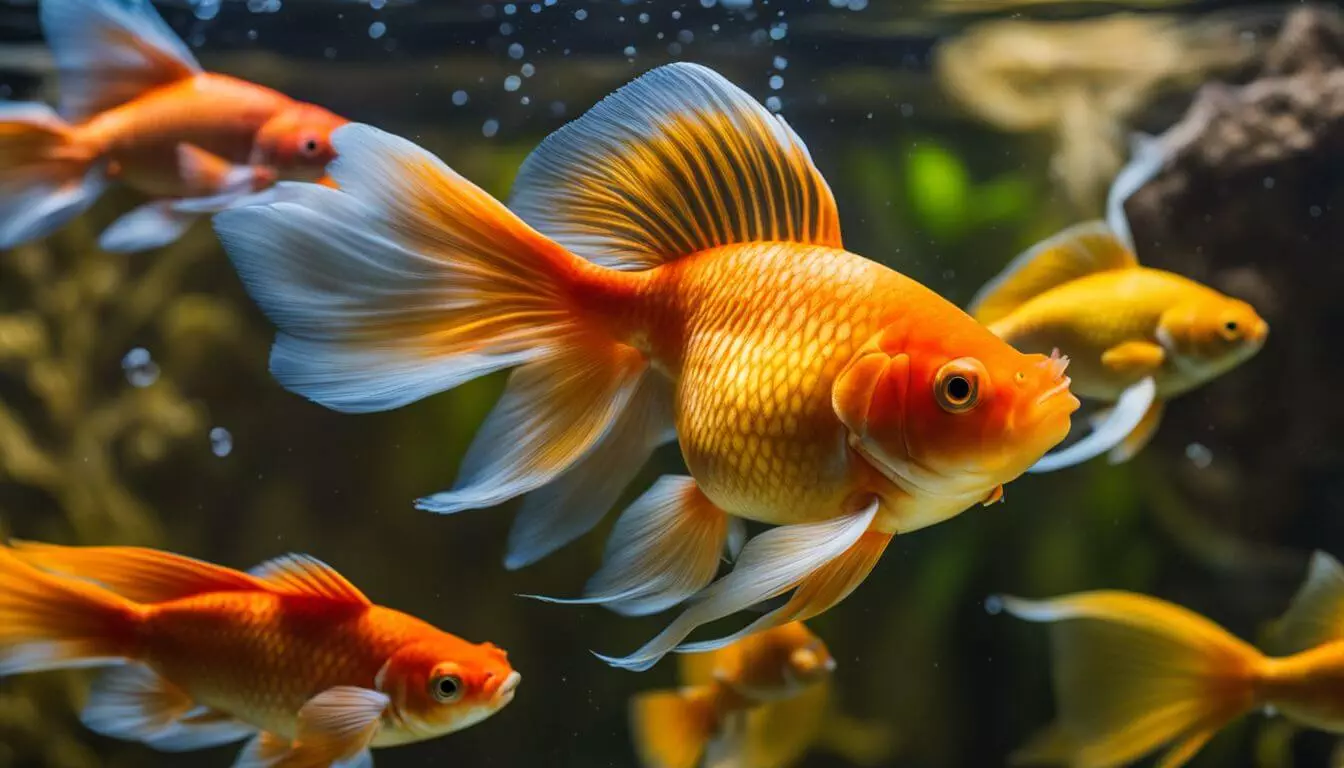
Goldfish lifespan often surprises new aquarists. While many expect these vibrant pets to live only a few years, the reality is quite different. With proper care, goldfish can thrive for decades—some even reaching their 30s or 40s! In fact, the oldest recorded goldfish lived an impressive 43 years.
Factors like Genetics, living conditions, and diet are the keys to unlocking their potential for a long, vibrant life and can influence how long goldfish live for. all play a role in a goldfish’s longevity. Varieties such as comets, black moors, and ryukins purchased from reputable breeders have the potential to live well into their 20s.
However, the average lifespan is often shorter, around 10-15 years, due to common environmental challenges. Creating the ideal home is key to helping your goldfish reach their full lifespan potential.
Creating the Ideal Home: Aquarium and Pond Considerations for Goldfish

[Here you go!]
To create the ideal home for your goldfish, you’ll need to consider their specific needs and preferences. Goldfish require ample space to swim and grow, with a minimum of 20 gallons per adult fish in an aquarium setting.
For smaller or younger goldfish, provide at least 10 gallons of water per fish, along with a high-quality filter to maintain pristine water conditions. If you’re considering a pond, ensure it’s large enough to accommodate your goldfish’s potential growth – some varieties can reach up to a foot in length! Proper filtration and aeration are crucial in both aquariums and ponds to keep the water oxygenated and free of harmful toxins like ammonia and nitrites.
In the world of goldfish, space is not a luxury, but a necessity for their health and happiness.
As an experienced aquarist and underwater photographer, I’ve witnessed firsthand the impact of a well-designed habitat on the well-being of goldfish. Whether you opt for an aquarium or a pond, providing your finned friends with a spacious, clean, and properly maintained environment is essential for their longevity.
Aquatic plants not only add aesthetic appeal but also help maintain water quality by absorbing excess nutrients, beneficial for a variety of goldfish. Additionally, they provide hiding spots and reduce stress levels for your goldfish.
By carefully considering these factors and creating an ideal home tailored to your goldfish’s needs, you’ll be rewarded with the joy of watching them thrive and potentially live well into their teens or even their 20s.
With the right habitat in place, let’s explore the role of diet in your goldfish’s longevity.
Feeding Your Goldfish: Diet’s Role in Longevity
Provide your goldfish with a balanced diet to ensure their longevity and vitality. Offer them a daily mix of high-quality flake food or sinking pellets containing around 30% protein.
Supplement their meals with color-enhancing foods and raw veggies like peas, green beans, or lettuce to provide essential nutrients and fiber.
Goldfish have a diverse range of lifespans depending on the variety of goldfish, including comet goldfish. specific dietary needs, so feed them flakes or pellets formulated for their species. While they can survive up to 2 weeks without food, regular feeding is crucial for their health.
Avoid overfeeding, as it’s a common issue that can lead to poor water quality and health problems. Steer clear of using feeder goldfish, often overlooked, can live longer than expected with proper care, emphasizing the question of how long do goldfish live for., as they lack proper nutrition and may introduce diseases into your aquarium.
Goldfish Care and Routine Maintenance for a Longer Life
Proper goldfish care involves maintaining a clean and healthy environment that supports their well-being. A few simple routines can make a significant difference in your goldfish’s lifespan.
- Regular water changes: Perform partial water changes of 10-25% every week to remove harmful nitrates and replenish the tank with fresh, clean water. Use a water conditioner to remove chlorine and other toxic substances from tap water before adding it to the tank.
- Filtration: Invest in a high-quality filtration system that includes biological, mechanical, and chemical filtration. Clean or replace filter media as needed to maintain optimal performance and promote the growth of beneficial bacteria.
- Water quality testing: Regularly test the tank water for pH, temperature, ammonia, nitrite, and nitrate levels using a reliable aquarium test kit, which is vital for determining the conditions in which goldfish may live long. Maintain a pH between 7.0 and 8.4, a temperature between 65-75°F (18-24°C), and keep ammonia and nitrite levels at 0 ppm.
- Substrate cleaning: Use a gravel vacuum or siphon to remove debris and waste from the substrate during water changes. This helps prevent the buildup of harmful substances and maintains a clean environment for your goldfish.
- Algae control: Manage algae growth by scraping the tank walls with an algae scraper and removing excess algae from decorations and plants. Avoid overfeeding and maintain proper lighting schedules to minimize algae growth.
- Proper feeding: Feed your goldfish a balanced diet consisting of high-quality pellets or flakes, along with occasional treats like frozen or freeze-dried brine shrimp, daphnia, and vegetables. Avoid overfeeding, as this can lead to digestive issues and water pollution.
- Monitoring fish health: Observe your goldfish daily for signs of illness or stress, such as lethargy, loss of appetite, or abnormal swimming patterns. Address any health concerns promptly by consulting a veterinarian or experienced aquarist.
Social Life in the Tank: Choosing the Right Goldfish Tank Mates
Goldfish are social animals that thrive in the company of their own kind or other compatible species. Selecting the right tank mates for your goldfish is crucial for their happiness, health, and longevity.
- Opt for goldfish of similar sizes and temperaments to prevent bullying or competition for food. Common goldfish, for example, can coexist harmoniously with other common goldfish, snails, and ornamental minnows.
- Avoid housing aggressive or fast-swimming fish with your goldfish, such as many goldfish of the comet variety, as they may nip at the fins or outcompete them for food. Predatory fish like cichlids or large catfish should never share a tank with goldfish.
- Introduce new tank mates gradually, adding no more than two goldfish at a time to allow the helpful bacteria in the aquarium to adjust to the increased bioload. Sudden overcrowding can lead to stress, disease, and a shortened lifespan.
- Provide ample swimming space and hiding spots, such as live plants or decorations, to reduce stress and promote natural behaviors. A well-designed aquarium with proper cover and filtration will encourage your goldfish to explore and interact with their tank mates.
- Monitor your goldfish closely after introducing new tank mates, watching for signs of aggression, stress, or illness. Be prepared to separate incompatible fish if necessary to maintain a peaceful and healthy aquatic ecosystem.
Advanced Tips to Help Your Goldfish Live Longer
To help your goldfish thrive into their golden years, consider advanced techniques that go beyond the basics. Invest in a high-quality aquarium filter to maintain pristine water conditions — crystal-clear H2O is vital for their long-term health.
Supplement their diet with nutrient-rich foods like freeze-dried brine shrimp or spirulina algae wafers to ensure they’re getting all the vitamins and minerals they need.
Keep a close eye on the nitrogen cycle understanding is crucial for sustaining the environment where goldfish may live for years. in your tank, as even small imbalances can lead to stress and disease over time. Regularly test the water parameters and make adjustments as needed to keep ammonia, nitrite, and nitrate levels in check.
With a little extra attention to detail and some advanced strategies up your sleeve, you can create an environment where your finned friends can flourish for years to come.
Conclusion
In caring for your goldfish, you hold the power to greatly influence their lifespan. A balanced diet, a spacious and well-maintained aquarium, and a stress-free environment are the keys to unlocking their potential for a long, vibrant life.
As you embark on this rewarding journey, your dedication will be reflected in the health and happiness of your finned friends. Watch with pride as they grow, knowing that your commitment contributes to their potential to live longer, reflecting on how long can goldfish live with proper care. commitment to their well-being, crucial for ensuring a long lifespan typical of pet goldfish., crucial for ensuring a long lifespan typical of pet goldfish., crucial for ensuring a long lifespan typical of pet goldfish. is the foundation for a thriving, enduring companionship.
FAQs
1. How long do goldfish live on average?
The average lifespan of a goldfish is 10-15 years, but with proper care, they can live up to 20 years or more. Factors like tank size, water quality, diet, and genetics all play a role in determining how long your goldfish will live. In terms of diet, goldfish thrive on a varied diet that includes high-quality pellets, fresh vegetables, and live or frozen foods such as brine shrimp. Speaking of which, the brine shrimp lifespan can vary depending on environmental factors. It is important to consider all aspects of care to ensure your goldfish can live a long, healthy life.
2. What factors affect a goldfish’s lifespan?
Several factors can impact a goldfish’s lifespan, including the size of the tank or pond, water quality, diet, and genetics. Providing a spacious environment, maintaining good water conditions, offering a balanced diet, and selecting healthy fish from reputable sources can help your goldfish live a long and healthy life.
3. Do different types of goldfish have different lifespans?
Yes, different goldfish types can have varying lifespans. Common goldfish, such as comets, tend to live longer than fancy goldfish varieties like orandas or ryukins. However, with proper care, most goldfish can live well into their teens or even their 20s.
4. What do goldfish need to live a long and healthy life?
To keep your goldfish healthy and help them live longer, provide a spacious tank or pond with good water quality, maintain a balanced diet, and ensure a stress-free environment. Regular water changes, proper filtration, and avoiding overcrowding are also essential for your goldfish’s well-being.
5. Can goldfish live in a bowl?
While goldfish are often kept in bowls, it’s not recommended for their long-term health and well-being. Goldfish need ample space to swim, grow, and thrive. A larger tank or pond with proper filtration and regular water changes is essential for keeping your goldfish healthy and extending their lifespan.
6. How can I tell if my goldfish is healthy and likely to live a long life?
A healthy goldfish will have bright, clear eyes, vibrant colors, and a clean, shiny appearance. They should be active, swimming gracefully, and have a good appetite. Maintaining excellent water quality, providing a balanced diet, and keeping an eye out for signs of stress or disease can help ensure your goldfish remains healthy and lives a long life.

